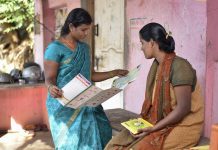
India is currently experiencing a lockdown due to the spread of the coronavirus infection. There have been reports of people finding to extremely difficult to access healthcare and medicine amid the limited medical infrastructure in the country. But what is interesting to note is that while the country struggles to contain and curb the spread of the coronavirus pandemic and offer healthcare to the affected population, there has been a sharp decline in the number of deaths caused by tuberculosis. States like Kerala reported unto 60% decline in tuberculosis associated deaths. From January to March 2020, Kerala had reported an average of 150 deaths per month but in April the number dropped to 39. Until the middle of May, only four tuberculosis deaths had been reported from the state.
There has been a significant drop as far as tuberculosis related deaths are concerned even from the neighbouring state of Karnataka, where from 472,357 and 292 deaths reported in January, February and March, only 118 deaths were recorded in April and only 20 so far in the May.
In Jharkhand too, the rate of tuberculosis related deaths dropped from over 100 per month until April, where it came down to only 35 in the month of May. Similar developments can also be recorded from Assam even if not so starkly.
Low Reportage of TB Deaths: A Cause of Concern
Experts and medical practitioners argue that it is becoming very difficult for them to explain why the number of tuberculosis related deaths is decreasing, especially when there is no medical justification for it and accessing care and nutrition has become much more difficult than before.
While many Indian states that have taken a note of the declining rates say that this is because of the success of the TB mitigation programs going on in their states. But experts working on TB research in India say that we should refrain from becoming too optimistic after seeing the falling number of deaths and instead be cautious of gaps in data collection.
During the lockdown, reporting and documenting of deaths related to TB has been on a decline and this has not allowed us to access to real extent of the problem. This lag in data collection and assimilation are to be blamed as one of the core reasons why there seems to be a steady decrease in the number of tuberculosis related deaths.
Diversion of Resource and Manpower to COVID-19 Programmes Derails TB Mitigation Schemes
Officials say that all the details related to India’s tuberculosis program are logged on a real time database known as Nikshay. Deaths are registered immediately into the database because there are financial implications associated with it.
All the registered TB patients in India are given a monthly allowance of Rs 500 through direct cash transfers during the course of the treatment to help them eat nutritious food. It is for this reason that authorities claim that deaths are reported on the database with immediate effect.
It is for this reason that community health workers have been given tablets so that real-time updates may be made to the database.
But due to the lockdown and inaccessibility of transportation, many health workers are facing hardships in reporting and registering deaths on the database in real-time.
This delay can range from a couple of weeks to months. This may then mean that although TB patients are dying amid the lockdown, the mentoring system is missing out on them. The hardships of reaching out and checking on patients have become bigger and it has become very difficult due to the lockdown and that is why field-level workers aren’t being able to follow up and help in the updating of data.
The protocol demands that community level health workers keep a constant check on notified patients and make sure that they consume medicines and arrive for scheduled check-ups at the tuberculosis local unit.
But during the lockdown this routinised system has received a major blow and patients haven’t been able to arrive for routine check ups and health workers are finding it tough to keep an eye on them due to inadequate manpower, because most of the staff is involved in COVID-19 associated work. Many villages in Jharkhand’s Jamatara district for example, have completely banned the entry of outsiders due to the pandemic and while many TB patients don’t even own mobiles, it is becoming difficult for health care workers to keep a track on the progress of patients. On the local level too, anganwadi workers and other people serving community health systems are finding it difficult to monitor the health of patients amid the limited manpower and anxieties about getting the infection themselves.
It is only when the times are normal, that the deaths that have been thus far unreported, can be registered and updated in the database. With resources being redirected and staff being absorbed in COVID-19 work, it may take many months before things become normal for the TB related medical infrastructure in the country.
The way the current pandemic is going on, it is not in the near future that the TB services are going to resume normally and data tracing becomes smooth. Even when normalcy is restored, it will be extremely difficult to report TB deaths with accuracy in retrospective.
With medical health partitioners increasingly more worried that the future could become more chaotic than ever, it looks like a very difficult proposition that the deaths of TB patients who are losing their lives amid the pandemic will find their way into the national level records.
With diverted manpower and diversion of medical resources, it wouldn’t be wrong to say that the present crisis has given a major blow to the country’s tuberculosis programme.













